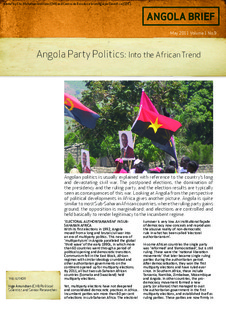| dc.contributor.author | Amundsen, Inge | |
| dc.date.accessioned | 2018-01-04T08:17:13Z | |
| dc.date.available | 2018-01-04T08:17:13Z | |
| dc.date.issued | 2011-06-05 | |
| dc.identifier | oai:www.cmi.no:4025 | |
| dc.identifier.citation | Bergen: Chr. Michelsen Institute (Angola Brief vol. 1 no. 9) 4 p. | |
| dc.identifier.issn | 1892-3933 | |
| dc.identifier.uri | http://hdl.handle.net/11250/2474725 | |
| dc.description.abstract | Angolan politics is usually explained with reference to the country’s long and devastating civil war. The postponed elections, the domination of the presidency and the ruling party, and the election results are typically seen as consequences of this war. Looking at Angola from the perspective of political developments in Africa gives another picture. Angola is quite similar to most Sub-Saharan African countries, where the ruling party gains ground; the opposition is marginalised; and elections are controlled and held basically to render legitimacy to the incumbent regime. | |
| dc.language.iso | eng | |
| dc.publisher | Chr. Michelsen Institute | |
| dc.relation | Angola Brief | |
| dc.relation | 9 | |
| dc.relation.ispartof | Angola Brief | |
| dc.relation.ispartofseries | Angola Brief vol. 1 no. 9 | |
| dc.relation.uri | https://www.cmi.no/publications/4025-angola-party-politics-into-the-african-trend | |
| dc.subject | Angola | |
| dc.title | Angola party politics: Into the African trend | |
| dc.type | Report | |
